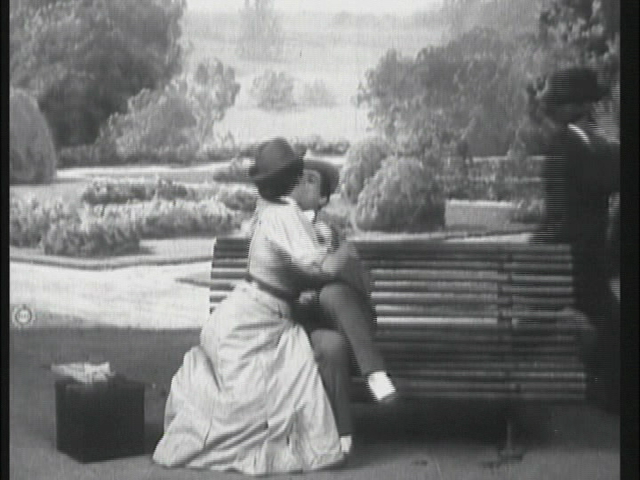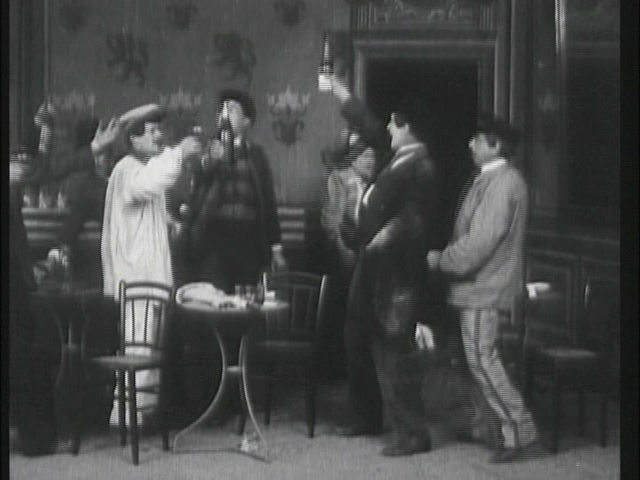
When the Lumière brothers started showing their short films in restaurants, George Méliès was in the audience, taking notes. Unable to buy a camera from the secretive brothers, he built his own, then built his own studio and made and distributed his own films.
Also in the audience, though less famously, was a secretary from Gaumont, a stills camera company, called Alice Guy. Impressed by the moving pictures, she volunteered for the job of director—which scarcely existed in any formal sense—when she heard that her company were thinking of making some moving pictures of their own. While early flickers consisted of documentary scenes of life on the streets (the Lumière tradition) or magic show performances (the early Méliès), Guy thought it would be fun to tell some little stories. This she did, though her early works contain plenty of performance pieces, Serpentine Dances is one famous production, although a more significant one might be Little Tich and his Big Boots, a record of the Victorian music hall comedian which Jacques Tati cited as teaching him everything he needed to know about screen comedy—sure enough, the film is basically a series of silly walks. Everything else, Tati taught himself.
With most of the films I jot about here, simple historical neglect and commercial interests can be assumed to account for their status as "forgotten," but with Alice Guy there does seem to be something more sinister afoot. From the very beginning, she was treated badly by the barely-formed screen industry. Gaumont agreed to her shooting pictures for them only on the basis that she do so on her day off, accept no salary for doing so, and didn't let it interfere with her secretarial duties. The role of filmmaker was so new, and so lacking in the mostly bogus prestige it has since accumulated, that even a woman could be allowed to do it (and there were many more women filmmakers in the first twenty years of movies than there would be in the next sixty).

And despite directing more than three hundred motion pictures, ranging from Lumière-like fifty second miniatures to substantial multi-scene dramas, Guy was written out of film history, her role as mother of narrative cinema (a whole third tradition which unites Lumièrian documentary with Mélièsian magic-shows) swept under a rug of lies woven from manly chest hair.
But Alice Guy is now back, in Kino box set entitled Gaumont Treasures, 1897-1913, celebrating her work along with that of Louis Feuillade and Leonce Perret. Guy's films, at least the sample here, don't have the artistry and artifice of Méliès, but they are pioneering works from a pioneering woman. Guy actually made it in America, crossing the Atlantic in 1910 and shooting ninety films in the US. While the earliest films used her fellow secretaries as actors, the later ones had professional casts and complicated narratives - in Falling Leaves (1912), a little girl overhears the family doctor say that her young brother will be dead by the time the last leaf has fallen from the tree outside his window. The girl tries gluing the leaves to the branches to keep him alive.
The finest, and strangest, film in the Kino set is The Consequences of Feminism, which seems to be a parody wrapped inside another parody, folded together into a sort of Moebius strip. The story takes place in a world gone mad, a nightmare vision of the future in which women have taken on the roles of men, drinking and smoking in pubs, and men have been reduced to the lowly, degraded status of the woman, looking after the babies and preparing dinner. O horrible inversion of nature! It's like Planet of the Apes only with women.
This sexual politics satire is a popular occasional them in science fiction, with versions cropping up all over—in television comedy series the BBC's The Two Ronnies (The Worm That Turned, 1980) and Polish movie Sex Mission (1982), and is used generally to deliver a reactionary sexist message, albeit sometimes in a tongue-and-cheek style.

Alice Guy, as a woman doing a man's job, makes this strange film stranger just by her presence. We have to assume she's laughing, and possibly at us. The film is crammed with farcical reversals of traditional scenarios, as in the melodramatic standard of the hapless wife appearing at the pub with her children in tow, hoping to shame her drunkard husband into returning home, a set-up still being played perfectly straight by D.W. Griffith in What Drink Did three years later. Guy's reversed version, in which a meek house-husband pleads with his hard-drinking, aggressive wife, only to be jeered away by her mannish cronies with their cigars and bustles, is funny and uncomfortable on several levels at once.

Likewise, an extraordinary moment when two gossiping house-husbands exchange a decorous kiss, and the "petting in the park" sequence in which a boorish wolf of a woman vigorously molests a bashful male on a park bench. In a straight-faced supposed critique of feminism, Alice Guy not only pokes fun at sexual stereotypes and indulges in some taboo imagery, she suggests the oppression women face. The whole thing—a plotless series of scenes related by nothing more than the overall concept—climaxes with a male insurrection in which the women are driven from the bar amid hurled chairs and waving fists from the menfolk, who then raise their bouteilles du bierre in a toast to male supremacy: a supremely contemptuous gesture from the filmmaker.
***
The Forgotten is a regular Thursday column by David Cairns, author of Shadowplay.